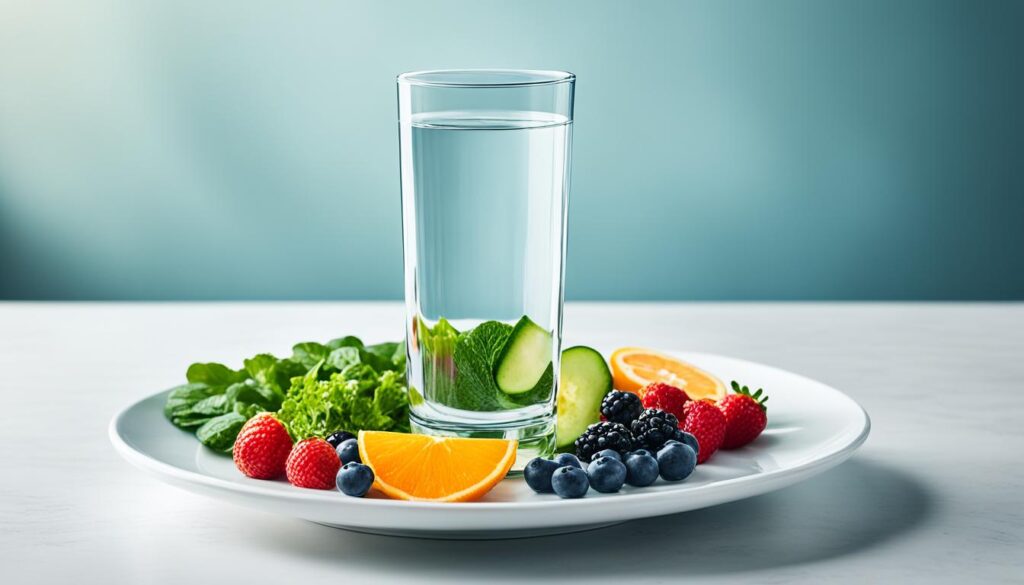Many people are trying different diets for better health and weight loss. Water fasting is one such diet. It’s where you only drink water for a certain time. People say it can improve heart health and help with losing weight.
But, like any diet, it has its downsides. You could feel tired or get headaches. It’s important to know these things before starting only to drink water.
If you’re thinking about water fasting, consider both the good and the bad. You might find you feel less stressed and your blood pressure goes down. Yet, you must also watch out for the risks.
Being careful is key. Talk to a doctor or health expert before you start. This way, you can try water fasting safely.
Understanding the Fundamentals: What is a Water Fasting Diet?
A water fasting diet is simply not eating and only drinking water. This idea has been around for a long time but is getting popular again. People do it to lose weight, clean out their body, and change their eating ways. Looking into what is a water fasting diet shows it’s not just for weight loss. It’s also seen as a body detox and a way to reset eating habits.
Historical Perspectives and Modern Resurgence
Water fasting has been practiced for centuries across different cultures and spiritual traditions. It’s not new, yet it’s gaining modern interest. People are drawn to it for its simplicity. Only drinking water for a while is appealing for its minimalism. This method is now popular in the wellness world. People say it improves mental focus and physical well-being.

Defining Water Fasting and Its Variations
When looking closer, water fasting has many styles. Some do a strict fast with only water. Others might drink tea or coffee if they don’t have calories. The essence of true water fasting is no calories at all, just water for a certain time.
General Guidelines and Typical Duration
If you’re thinking of trying a water fast, it typically lasts from one to three days. But, knowing how to do a water fast safely is key. Medical advice is a must before starting. It’s important to follow guidelines carefully. This is to make sure your health isn’t at risk. Fasting isn’t right for everyone. Things like medicines and existing health problems need to be looked at.
| Duration | Purpose | Considerations Before Starting |
|---|---|---|
| 24 hours | Short-term reset | Medical consultation needed |
| 48 hours | Moderate cleanse | Monitor for adverse effects |
| 72 hours | Extended benefits | Suitable for nonsmokers with no medications |
The interest in water fasting diets shows people’s curiosity about different health practices. It’s about taking care of oneself and making your own health choices. But, what is a water fasting diet if you don’t know the risks and proper steps? It requires being cautious, well-prepared, and getting advice from professionals to do it right.
The Intriguing Benefits of Water Fasting
Water fasting for health brings up many interesting points. Studies show it can lead to major changes in our bodies. People are looking into water fasting more as they learn about its advantages. It’s known for helping lose weight, bettering heart health, and lowering blood pressure.
Research clearly shows just drinking water reduces oxidative stress. This stress is linked to long-lasting diseases. Yet, health experts are debating how lasting these benefits are.
| Benefit | Study Findings |
|---|---|
| Weight Loss | Reduction in body weight and BMI |
| Blood Pressure | Normalization in hypertensive patients (10-11 days) |
| Oxidative Stress | Decrease in markers linked to chronic diseases |
But, there’s a word of caution about water fasting. Almost half of the people in a study had to stop because of bad side effects. So, the quick health perks might seem tempting. Yet, it’s key to think about the risks and talk to a doctor before starting a water fast.
Potential Health Risks and Side Effects
Water fasting may seem beneficial for health, but it’s important to know the risks of water fasting. These risks can affect your body and mind. Knowing key water fasting tips can help you fast safely or avoid dangerous outcomes.
The Physiological Impacts of Prolonged Fasting
Going without food for too long during a water fast causes many body issues. The body looks for other energy sources, which stresses it out. This stress can lead to headaches, exhaustion, and dizziness, making daily tasks hard.
Identifying High-Risk Groups
Certain people should not try water fasting. For instance, pregnant women, those with chronic conditions like type 1 diabetes, and anyone on regular medication. These groups face bigger risks of water fasting. It could harm their health and even affect others, like unborn babies.
Medically-Supervised Fasting vs. Do-It-Yourself
Choosing to fast on your own is different from medically-supervised fasting. The supervised way has experts watching and ready to help if things go wrong. Without this professional support, individuals may not know how to deal with problems. This lack of knowledge can increase health dangers and make the fast less effective.
| Aspect of Fasting | Medically-Supervised | Do-It-Yourself |
|---|---|---|
| Professional Monitoring | Continuous | None |
| Risk of Complications | Reduced | Increased |
| Access to Immediate Care | Yes | No |
| Guidance on Breaking the Fast | Structured Plan | Often Undefined |
| Support System | Professional Team | Self or Peer-based |
Don’t rush into fasting. With the right water fasting tips, you can attempt it more safely and be better informed. Always think about your health and specific situation before starting any fasting.

Water Fasting for Weight Loss: Myth vs. Reality
Water fasting for weight loss has caught many people’s attention as a fast way to lose weight. Initially, the weight seems to drop quickly during water fasting. However, this quick weight loss is mostly losing water because the body uses up glycogen, which holds water.
Also, a significant amount of muscle may be lost during a water fast. Although muscle can be gained back with good nutrition and exercise, the real problem is losing and then gaining back fat. Losing fat for good takes longer, making people question if fasting works well over time for weight control.
Even though there’s an initial weight drop, the effectiveness of water fasting for long-term weight loss is doubtful. It doesn’t help build lasting, healthy eating habits needed for ongoing weight control.
Is water fasting suitable for long-term weight management? The science on water fasting for weight loss isn’t strong. This is especially true when compared to other strategies that focus on a balanced diet and staying active.
| Weight Loss Component | Immediate Effect | Post-Fasting Recovery |
|---|---|---|
| Water Weight | Significant Decrease | Rapid Rebound |
| Muscle Mass | Moderate Decrease | Relatively Quick Recovery |
| Fat | Slower Decrease | Gradual Recovery |
In the end, water fasting might give you quick weight loss results, but its value over the long run is doubtful. The quick weight gain after fasting and not promoting lasting, healthy habits makes water fasting a questionable way to manage weight.
Comparative Analysis: Water Fasting vs. Intermittent Fasting
Many people look into water fasting and intermittent fasting (IF) to better their health and manage weight. Compared to water fasting, intermittent fasting is often seen as more flexible and supported by studies. It helps with metabolism, keeping blood sugar levels in check, and might enhance brain function. This is all without having to stop eating completely.
Intermittent fasting includes something called time-restricted eating (TRE), which water fasting doesn’t offer. TRE lets people eat what they need within certain parts of the day. This shows the key difference between the two: intermittent fasting is about the timing of meals, while water fasting means not eating at all.
Studies point out that intermittent fasting can boost energy and help with losing weight. But, we still need to learn more about its long-term impacts. Water fasting can quickly alter body shape and heart health, but it’s risky. Both methods should be checked out with a healthcare pro, especially for newbies or those with health issues. Getting the right advice can lead to a safe and successful fasting plan that meets your health needs.




